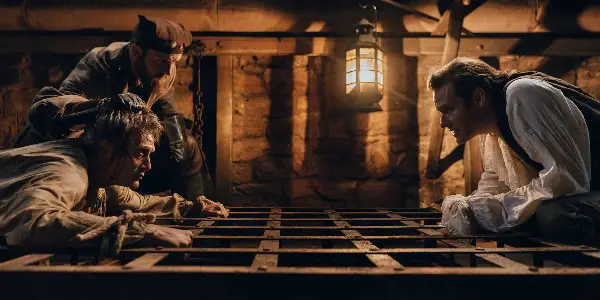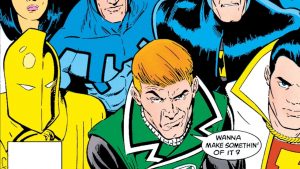
The Promised Land opens in 18th century Denmark where the king looks to coax settlers to the Jutland Heath. If they can tame the wilderness, it will make it suitable for farming and, thereby, civilization. Director and Co-writer Nikolaj Arcel worked with Mads Mikkelsen about a decade ago with The Royal Affair, and their follow-up finds them working in an overlapping historical milieu.
When we meet Ludwig Kahlen, it’s easy to read this as an archetypal Man vs. Nature saga. Mikkelsen even proved his mettle in something as recent as Arctic — a modern-day iteration if you will. However, as we get more engaged with the drama, the natural world sometimes feels like the least of his worries given the onslaught of hardship that comes to him at the hands of men.
I would follow the actor to the ends of the earth wherever his movies take him. He has to be one of the most indelible faces in modern cinema, making it a perennial joy watching him at work. He’s inscrutable; there’s a sense he’s been through more than we can even imagine, and yet he tells us everything we need to know.
Kahlen has 25 years of service in the army. A man of humble stock, he’s risen up the ranks and strives to be given a noble title. With this aim, he journeys to the barren land bankrolling the undertaking with his meager pension and christening his new outpost “King’s House.” If he succeeds in clearing the heath for crops, the reward will be ample.
The original Danish title of the movie is much more pointed. The literal translation would be “The Bastard,” but it has much more to do with an assertion of his lineage than a pronouncement of his character. His mother was a lowly chambermaid and he was born out of wedlock and sent away to the military at a young age by an absent father.
source: Magnolia Pictures
Kahlen’s a punctilious fellow who’s severe and dogged in his standards. His outward appearance is that of a grizzled man of the earth, but he lives his life with the expectations of a nobleman. He’s either got delusions of grandeur or the most lofty and singular aspirations. The chip on his shoulder from his illegitimate birth is something he fights to rectify. Because he knows the rules and the system, and he’s prepared to get ahead by the only means possible for a man of his station — earning it by the grit of his teeth.
One of his few allies is a pastor who desires to build a new parish since he believes it’s time for God’s light to shine on the heath. Another admirer comes from a very different context: The impish Elene Helene Elising (Kristine Kujath Thorp) is betrothed to be married to her cousin in exchange for the rectifying of her father’s outstanding debts. She takes much more interest in the stoic ex-soldier. You can sense the sparks of attraction almost before they begin to kindle.
Frederich Schinkel (Simon Bennebjerg) is part of the nouveau rich, an arrogant, nihilistic moneybag who bought his title; he wasn’t born into it like other aristocrats. Thus, he has more in common with Kahlen than we might suspect. Still, their initial meeting sets up our respective camps of opposition. He comes on affably with all the charisma at his disposal.
He says, “The heath is Gods creation in all its glory. Why castrate a wild beast that only wants to be free.” He turns a bit more pragmatic minutes later when he adds, “God is chaos. Life is chaos.” Only when we acknowledge this can we enjoy our insignificant little lives. Kahlen respectfully disagrees sipping his wine before moving forward with his best-laid plans. We know where both stand and when an immovable object meets an irresistible force, as it were, one must give way.
A Harrowing Class Divide
The Promised Land is so much more than I anticipated. It establishes itself as an expansive drama; it’s as much about one man’s tenacity as it is about class and the world stacked up against him that he’s trying so hard to break into.
It’s a love story and a period tale with all the gaudy accouterments we rarely see in the present day. It’s a battle of wills and ideologies birthing uneasy alliances among those subjugated to the fringes, fighting for their place at the table beyond mere scraps.
source: Magnolia Pictures
A few characters come to the fore including Anmai Mus, a young orphaned vagabond who is taken into Kahlen’s encampment. At first, she’s a nuisance and then progressively evolves into a treasured member of his family. There is a runaway farmhand seeking asylum away from the cruel sadism of Schinkel along with his wife (a brilliant Amanda Collin). Kahlen doesn’t have to but he quietly puts himself on the line for them even as he drives a hard bargain. He needs help in the undertaking, and they’re in no place to negotiate terms.
It’s easy to make blatant generalizations but the utter frivolity and tone-deafness of the nobles drips from the movie especially after we spend so much time with the austerity of the heath. The images of the elite conjure up the Rococo period in France — one particular zenith of excess — but it also suggests this kind of profane luxury permeated all across Europe.
The most startling expression of this comes as some onlookers at a grand soiree watch an angelic musical performance as a fugitive worker is scalded with boiling water in the background. It turns the stomach, but guests titter at the master of the manor’s tasteless jokes. It’s repulsive and cruel in a manner ill-befitting anyone who believes all human beings have worth. Frederich has already made it abundantly clear that he does not.
Meanwhile, Kahlen is continually being assailed by any number of trials, and be it pride or whatever else, he always seems to choose the decision that will make life that much harder for him. He will not abandon his project; his secret weapons are hardy German potatoes, and even as he lives as a pauper, he holds fast to his vision of a future harvest he cannot see yet.
In a later rendezvous, after Schinkel has tried to rebuff his progress at every turn, they meet inside the man’s coach. It’s frigid cold outside, Kahlen has been buffeted by the winter, and he’s near starvation. He’s offered a deal with the devil in the cozy interior: a satchel of gold with enough to build two whole settlements far away from Frederich. The only catch is that Kahlen must give up on the heath and accept defeat.
source: Magnolia Pictures
And still, he is inexorable. He cannot be quelled. Kahlen is a proud man…and it could just as easily be his undoing or lead to a road of success. Mikkelson takes each of his unenviable decisions with a near-emotionless resolve letting each setback roll off his back, and then he pushes onward.
It comes to a head when he starts to care for people and thus finds himself at an impasse ultimately hurting those he cares about most.
Conclusion: The Promised Land
The movie boasts a resplendent scope so often missing from our modern storytelling. We have big blockbuster movies, but so often the ideas and characters feel small and inconsequential. The intimate human emotional connection is also so often lacking.
Here everything feels as if it matters. Evil is incredibly evil; the impediments to good are innumerable, and protagonists are flawed as much as they are emblazoned with the hallmarks of heroes. Pain and suffering are never shirked. The violence is evident even shocking in its most gruesome forms. The drama is gutting and so attuned to our condition if we do believe human life is significant and people do matter. What the movie says implicitly about family and loyalty is profoundly moving because it is developed mostly through action if not always through words.
There’s also a substantial difference between knowing where a film’s going and finding it conventional or thinking instead that it’s taken you right where you want to be — delivering on the kind of catharsis the best forms of storytelling give us. They set everything up and put measures in place to take us on a journey so we might witness and then end up precisely where we are meant to be.
By the final image of The Promised Land, we’ve been taken on an epic adventure, and in our heart of hearts, we are sated by the sweep of it all. And not just the sweep but the sense that all is right with the world — there is reestablished order within the chaos.
4.5/5 Stars
The Promised Land was released in theaters on February 2, 2024!
Does content like this matter to you?
Become a Member and support film journalism. Unlock access to all of Film Inquiry`s great articles. Join a community of like-minded readers who are passionate about cinema – get access to our private members Network, give back to independent filmmakers, and more.









